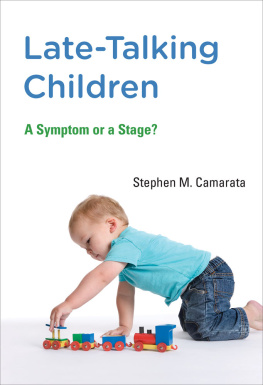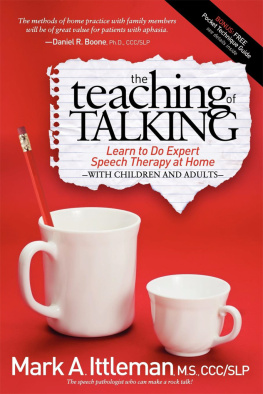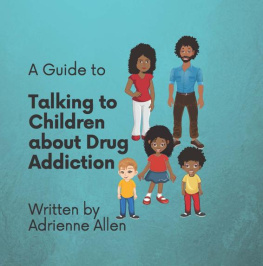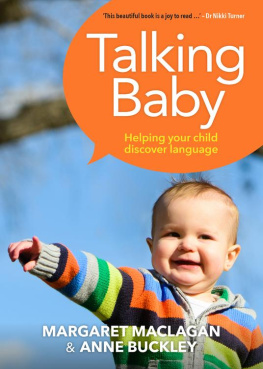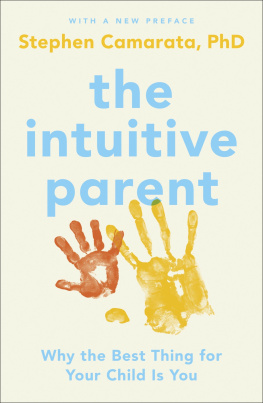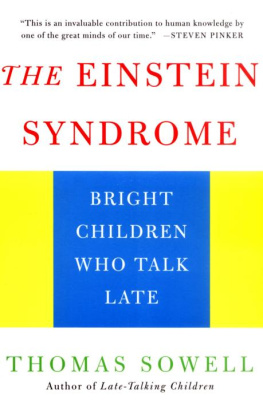Late-Talking Children
Late-Talking Children
A Symptom or a Stage?
Stephen Camarata
The MIT Press
Cambridge, Massachusetts
London, England
2014 Massachusetts Institute of Technology
All rights reserved. No part of this book may be reproduced in any form by any electronic or mechanical means (including photocopying, recording, or information storage and retrieval) without permission in writing from the publisher.
Library of Congress Cataloging-in-Publication Data
Camarata, Stephen M., 1957- author.
Late-talking children : a symptom or a stage? / Stephen M. Camarata.
p. cm.
Includes bibliographical references and index.
ISBN 978-0-262-02779-3 (hardcover : alk. paper)
ISBN 978-0-262-31934-8 (retail e-book)
1. Language disorders in children. 2. Language disorders in childrenDiagnosis. 3. ChildrenLanguage. 4. Developmentally disabled childrenEducation. I. Title.
RJ496.L35C34 2014
618.92855dc23
2014003809
d_r1
This book is dedicated to late-talking children and their families: May it help guide their journey!
Preface
The information in this book is a combination of personal experience, clinical observation, and scientific study. Long before I became a professor of hearing and speech, or a speech pathologist, I was already quite familiar with the anxiety experienced by parents of late-talking children. My own mother told me about the stress that she went through in the three years before I began to speaka time when she was haunted by fears that I might never live a normal life. She was also plagued by the nagging question of whether she might have done something (or failed to do something) that caused me not to be able to speak.
My wife Mary Camarata (an accomplished speech language pathologist herself) and I also faced these haunting fears because one of our own children was also late talking. When he was just three years old, we were told that he would never go to college and that he belonged in a separate special education classroom for children with intellectual disabilities. Fortunately, those dire predictions did not come true. But I know firsthand what parents go through when their child doesnt begin talking on time.
This experience led me on a quest to understand why this dire, but incorrect, prediction was made and whether this was happening to other families with a late-talking child. Even at that time, more than 20 years ago, the available clinical and scientific literature should have prevented what happened to my son. Through this experience, I came to realize that parents themselves need information about late-talking children, so they can better navigate the confusing maze of diagnoses and treatment options.
In addition to being a late talker and the parent of a late- talking child, I have also been a speech pathologist for more than 30 years. I have tested and treated children whose late talking was a symptom of autism, apraxia, social communication disorder, speech and language disorders, as well as those with intellectual disability. Of course, I have also seen many whose late talking was simply a passing developmental stage rather than a symptom of a more serious condition. And I have seen those, like Albert Einstein, whose late talking was associated with high intelligence in mathematical or analytical ability. I have watched these children grow up and worked with themand with their parentsthrough preschool, elementary, middle school, high school, and college. Along the way, I have learned about all the terrific services many of these children receive, but I have also seen the pitfalls, especially when a child is mislabeled, as was the case with my late-talking son.
I have also had the privilege of working with the many outstanding teachers and clinicians whose dedication and heroic efforts to teach and to treat late-talking children has been an inspiration. In an ideal world, all teachers and clinicians would be like these remarkable professionals so that parents could confidently seek answers for their late-talking child. Unfortunately, as was the case when my son was mislabeled as intellectually disabled, I have also had to help assist well-meaning, but misguided, teachers and clinicians understand that the labels they were using were not accurate and that treatments and educational programs derived from these labels were not beneficial. Sadly, far too many parents I have met in our clinical research program have reported that my experience with our late-talking son was not at all an isolated event and is instead an ongoing problem. These parents report encountering disbelief and condescension from some clinicians and teachers when asking reasonable questions about diagnosis, treatment, or educational programs for their own late-talking child.
As a scientist working in a highly ranked academic medical center, I have conducted dozens of studies with late-talking children of various types and have read hundreds of other studies on the subject. The gap between scientific knowledge on late-talking children and what is happening in the field is striking. Although there is still so very much that is not known, there is quite an extensive scientific literature to guide clinicians as they diagnose and treat late-talking children. Unfortunately, parents may encounter clinicians who are not current in their knowledge and implementation of this scientific literature. In fact, some clinicians may not even be aware of the well-established finding that most late-talking children do not have autism, apraxia, intellectual disability, or any other dire condition so that they mistakenly try to diagnose all late-talking children with one or more of these conditions.
Several years ago, I met with one of the worlds leading pediatricians, who, at the time was director of a major childrens hospital in Los Angeles. As we were discussing the problems facing parents seeking information on late-talking children when there are so many misconceptionsand outright deceptive practices they may encounter. His sage advice was to write a book providing parents with accurate, up-to-date information, so they can be in a position to demand accurate diagnosis and proper treatment for their late-talking child. Acting on this advice, I wrote this book so that parentsand interested clinicians and other professionalscan learn the facts and fallacies related to late-talking children and realize that often it is a developmental stage that some children go through rather than a symptom of a serious disability. Ive also included a set of action steps that parents can take when they need to develop the right diagnosis, treatment, and education plans their child will need if the late talking is a symptom of autism, speech disorders, social communication disorder, intellectual disability or another medical condition. And, these action steps also include methods for correcting labels and treatments that may be pushed upon them by well-meaning, but misguided experts who have inadequate information about late-talking children and misunderstandings about the particular child being evaluated.
As I say in the chapters ahead, another key is remembering that talking late is often a harbinger of your childs learning style: other things may come late too. So dont panic if your child is a late talker. Instead, learn everything you can about late- talking children and how to advocate effectively for your child. Even if the late talking is a symptom of autism or some other long-lasting condition, there are steps that parents can take to improve their childs future. Well begin this crucial learning process in the pages that follow.
Acknowledgments
I am indebted to many people who have directly or indirectly supported the development of this book. First and foremost is my own late-talking son, who inadvertently set my feet on the path to writing a book for parents and clinicians because of our own experiences, good and bad, as we sought help for him. The inspiration and support of my wife Mary has also been crucial in so many ways. I learned through her eyes about the unique hopes and fears so many mothers have as they raise a late-talking child. Because I also talked late, she helped me understand what my own mother must have gone through, first in the years before I started talking and then later as there were rough spots when I went to schools that were not conducive to adjusting the curriculum to the learning styles that work best with late-talking children. Mary also talked me out of including a chapter entitled Late Talkers: You Married One and You Have One, reflecting on the difficulties that she and many other spouses and parents encounter when living with a partner and a child who display the strong-willed tendencies seen in many late-talking children. She has unfailingly been a terrific mother and advocate for our late-talking son, while patiently tolerating my own late-talker idiosyncrasies.
Next page
